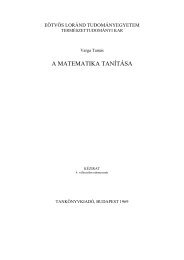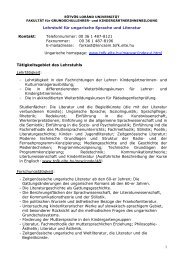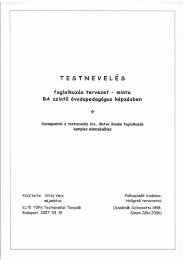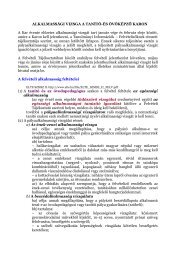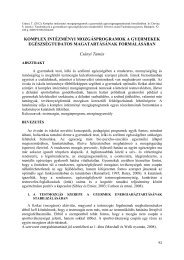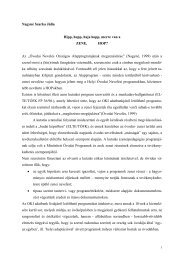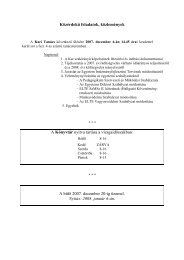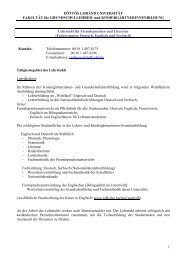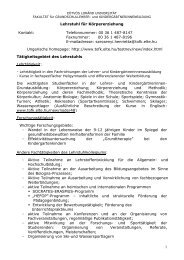Ének - zene - nevelés - ELTE TanÃtó - Eötvös Loránd ...
Ének - zene - nevelés - ELTE TanÃtó - Eötvös Loránd ...
Ének - zene - nevelés - ELTE TanÃtó - Eötvös Loránd ...
You also want an ePaper? Increase the reach of your titles
YUMPU automatically turns print PDFs into web optimized ePapers that Google loves.
Moore, R. & Standley, J. M. (1996). Therapeutic effects of music and mother’s voice on premature<br />
infants. Pediatric Nursing, 21. 509–514.<br />
Muir, D.W., Humphrey, D. E. & … (1994) Pattern and space perception in young infants (Spatial Vision,<br />
8, 141–165)<br />
Olds, C. (1985). The Fetus As a Person. Birth Psychology Bulletin,Vol. 6, No. 2. Fall<br />
Papousek, M. (1996). Intuitive parenting: a hidden source of musical stimulation in infancy. In I.<br />
Dellege and J. Sloboda (Eds.). Musical beginnings: Origins and development of musical competence,<br />
pp. 88–112. New York: Oxford University Press.<br />
Papousek, M., Bornstein, M. H., Nuzzo, C., Papousek, H. & Symmes, D. (1991). Infant responses to<br />
prototypical melodic contours in parental speech. In: D. Muir & A. Slaer: Infant Development.<br />
Oxford: Blackwell Publishers, 261–268.<br />
Raffai J. Dr. (1999) Megfogantam, tehát vagyok. Párbeszéd a babával az anyaméhben. Útmutató Kiadó<br />
Bp.<br />
Robb, L. (1999). Emotional musicality in mother-infant vocal affect, and an acoustic study of postnatal<br />
depression. Musicae Scientiae Special Issue 1999–2000, 123–154.<br />
Rock, A.M.L., Trainor, L.J. & Addison, T.L. (1999). Distinctive messages in infant-directed lullabies<br />
and play songs. Developmental Psychology. 35. 527–534.<br />
Schellenberg, E. G. & Trehub, S. E. (1996). Natural musical intervals: Evidence from infant listerners.<br />
Psychological Science, 7. 272–277.<br />
Siddiqui, A. & Haegloff, B. (2000). Does maternal prenatal attachment predict postnatal motherinfant<br />
interaction? Early Human Development. 59. 13–25.<br />
Shetler, D. (1985). Prenatal Music Experiences. Music Educators Journal, 26–31.<br />
Snow, M. (1998). Infant Development. Upper Saddle River, NJ: Prentice Hall.<br />
Standley, J. M. & Madsen, C. K. (1990). Comparison of infant preferences and responses to auditory<br />
stimuli: music, mother, and other female voice. Journal of Music Therapy, 27. 54–97.<br />
Stern, D. N. (2000). Putting itme back into our considerations of infant experience: A microdiachronic<br />
view. Infant mental health journal, 21, 21–28.<br />
Thurman L., Chase, M. & Langness, A. P. (1987). Reaching the young child through music: is prenatal<br />
and infant music education possible? ISME Yearbook, Vol. XIV. Music Research<br />
Trainor, L. J., Clark, E.D., Huntley, A. & Adams, B.A. (1997) The acoustic basis of preferences for<br />
infant directed singing. Infant Behavior and Development, 20. 383–396.<br />
Trainor, L. J. & Heinmiller, B.M. (1998). The development of evaluative responses to music: Infants<br />
prefer to listen to consonance over dissonance. Infant Behavior and Development, 21. 77–88.<br />
Trehub, S. E. & Schellenberg, E. G. (1995). Music: its relevance to infants. In: R. Vasta (Ed.). Annals<br />
of Child Development, v. 11. London: Jessica Kingsley. PP 1–24.<br />
Trehub, S. E. & Trainor, L. J. (1993). Listening strategies in infancy: the roots of music and language<br />
development. In: S. McAdams & E. Bigand (Eds.). Thinking in sound: the cognitive psychology<br />
of human audition. Oxford: Oxford University Press, pp. 278–327.<br />
Trehub, S. E., Trainor, L. J. & Unyk. A. M. (1993). Music and speech processing in the first year of<br />
life. In: H. W. Reese (Ed.). Advances in Child Development and Behavior 24. New York: Academic<br />
Press, 1–35.<br />
Trehub, S. E., Unyk, A. M. & Trainor, I. J. (1993a). Maternal singing in cross-cultural perspective.<br />
Infant Behavior and Development. 16. 285–295.<br />
Trehub, S. E., Unyk. A. M., Kamenetsky, S. B., Hill, D. S., Trainor, L. J., Henderson, J. L. & Saraza,<br />
M. (1997). Mothers and fathers singing to infants. Developmental Psychology. 33. 500–507.<br />
Unyk, A. M., Trehub, S. E., Trainor, L. J. & Schellenberg, G. (1992). Lullabies and simplicity: a<br />
cross-cultural perspective. Psychology of Music, 20. 15–28.<br />
33



